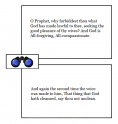A parallel between New Testament and Qur’an noted
[ by Charles Cameron — picking up on a point in conversation with Itamar Marcus ]
.
There’s a Qur’anic passage that is often quoted by opponents of Islam to suggest the Prophet acted lecherously and composed certain Qur’anic verses to grant himself divine authorization for sleeping with those with whom he would not otherwise have had the right to sleep. I don‘t presume to sit in judgment of the Prophet here, nor intend to get into the discussion of cross-cultural sexual morality. I take scriptures as scriptures with respect, and my interest is solely in the wording by which Allah instructs the Prophet, in the Qur’an, at 66.1 – here quoted in the upper panel in AJ Arberry’s translation:
The lower panel – and again, I don’t intend to get into the spirituality of Jewish dietary restrictions – comes from a passage in the New Testament book of Acts (10. 9-16), in which Peter in a vision refuses to eat food he considers unclean, and is reproved by God for considering ritually impure what God is declaring pure.
What interests me here is that in each case we see a divine “loosening” of a previously “tight” behavioral injunction.
It is probably wise, too, to remember that dietary morality in Judaism in the time of the Acts of the Apostles may well have been taken as seriously as sexual morality in the time of the Sunna and Companions of the Prophet: different cultures in different centuries weigh such things very differently from the secular (and sometimes puritanical / salacious) western mind of today.
**
Let us look at the context of the remark made by God to Peter in a vision, taking that context in two stages. The immediate story of Peter, God and the pure / impure food is found in verses 9-16 of Acts, chapter 10:
Peter went up on the roof to pray. He became hungry and wanted something to eat; and while it was being prepared, he fell into a trance. He saw the heaven opened and something like a large sheet coming down, being lowered to the ground by its four corners. In it were all kinds of four-footed creatures and reptiles and birds of the air. Then he heard a voice saying, “Get up, Peter; kill and eat.” But Peter said, “By no means, Lord; for I have never eaten anything that is profane or unclean.” The voice said to him again, a second time, “What God has made clean, you must not call profane.” This happened three times, and the thing was suddenly taken up to heaven.
There are various translations of the verse I highlighted in the DoubleQuote, verse 15, as you might expect — and they could probably be graded from “easily digestible” to “venerable and archaic” with varying degrees of nuance in between. Thus The Living Bible (TLB, a paraphrase) has:
The voice spoke again, “Don’t contradict God! If he says something is kosher, then it is.”
which at least tells us it’s kashrut the passage is talking about. But for utter simplicity it’s hard to beat The Message:
The voice came a second time: “If God says it’s okay, it’s okay.”
So. Peter felt himself unauthorized to kill and eat something “unclean” and God rebukes him for imposing on himself a restriction God himself claims he is free from, telling him that the visionary food is in fact pure.
The Orthodox Jewish Bible translates the verse (Gevurot 10.15):
And the bat kol came to Kefa again for a second time, “What Hashem made tahor (clean), you should no longer regard as tameh (unclean).”
— noting a reference to Bereshis (ie Genesis) 9.3.
**
But there’s a context to that context, too, and it’s fascinating in part because it indicates that Peter’s vision contains not a literal but a metaphorical meaning and morality. Peter himself is confused once he returns to his senses. And then all becomes clear…
The whole event takes place while a Roman centurion’s messengers are approaching Peter, who then accompanies them at their request to the centurion’s house, where Peter says (verse 28):
Ye know how that it is an unlawful thing for a man that is a Jew to keep company, or come unto one of another nation; but God hath shewed me that I should not call any man common or unclean.
Page 1 of 2 | Next page
